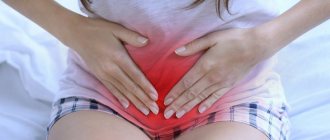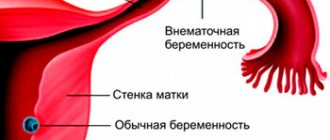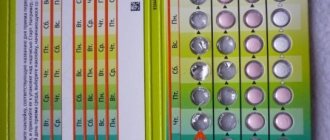01.06.2018
192
- Premenstrual syndrome
- Pregnancy
- Ectopic pregnancy
- Cystitis
- Adhesive disease
- Using an intrauterine device
There are many reasons why your stomach hurts and your period does not start. Conventionally, they can be divided into two categories: physiological (severe premenstrual syndrome and pregnancy) and pathological (ectopic pregnancy, cystitis, adhesions in the pelvis, oncological formations, appendicitis and many others). It is important to learn to determine which group the pain belongs to in order to consult a doctor in time.
How and why does your stomach hurt before your period?
Girls who are familiar with the phenomenon of dysmenorrhea (pain during menstruation) know firsthand that the sensations can be completely different - it can be either moderate pain with general malaise, or a fairly serious deterioration in condition, accompanied by various symptoms, such as fever , nausea, vomiting.
Sometimes the whole body can hurt, and sometimes there is no pain at all. The reasons for the appearance of these sensations may be different:
- Hormonal problems, when the lower abdomen pulls due to frequent contractions of the uterine walls due to an excess of the hormone prostaglandin in the body.
- Stress before the start of the cycle, other emotional stress.
- Lack of minerals, in particular magnesium.
- Various pathologies.
Harbingers of menstruation
It is quite difficult to understand why your stomach hurts and your period does not start. Especially for young girls who are just beginning to get used to the changes occurring in the body. Even adult women are not able to distinguish normality from pathology, correctly assess their condition and explain the cause of pain in the lower abdomen and the absence of menstruation.
Women are very familiar with typical premenstrual symptoms. Most often, on the eve of critical days, the following symptoms appear:
- Breast pain, engorgement, enlarged mammary glands.
- Nagging pain in the lower abdomen and lumbar region.
- Weakness, dizziness, attacks of nausea, dry mouth.
- Severe swelling, increased sweating.
- Stool disorder (diarrhea or constipation).
- Irritability, tearfulness, mood swings.
- Insomnia, absent-mindedness, increased anxiety.
- Decreased sexual desire.
- Heart rhythm disturbance.
Norm or pathology
So, should you be afraid of the appearance of this symptom? Experts advise, first of all, to calm down. In gynecology, a deviation of the menstrual cycle for several days is considered normal, even if abdominal pain began before the appearance of bleeding. There are many factors that could cause the cycle to shift slightly.
However, if the delay is more than 4 days, then you must consult a doctor as soon as possible to exclude the possibility of infections and pathologies.
How to determine if your period is late
The menstrual cycle normally lasts 21-35 days. The absence of discharge for more than 5-7 days is a reason to consult a doctor. You need to do a pregnancy test at home. If the test is negative, the gynecologist prescribes hysteroscopy. This procedure allows you to examine the uterine cavity to determine pathologies.
A delay in menstruation is divided into three stages:
- 1. Menstruation is 5-7 days late from normal.
- 2. A disorder in which the menstrual cycle lengthens to 40-60 days. Fluid release occurs over 1-2 days.
- 3. Absence of menstruation for more than 6 months.
The standard delay in a healthy woman occurs no more than 2-3 days. A deviation is considered to be an extension of the cycle for a week or more. Women over 45 years old suffer from hormonal imbalances, which indicate the approach of menopause. The discharge will be scanty and the cycle will lengthen.
How the lower abdomen pulls during pregnancy
A young mother may not immediately understand what changes are happening to her body, because sometimes the lower abdomen feels tight even during menstruation, and there is no guarantee that the bleeding will stop with the onset of pregnancy.
Therefore, you need to be careful with this, otherwise you may accidentally miss one of the most important moments in a woman’s life.
Early deadline
In the early stages, a complaint of aching pain is a very common occurrence, and not all young mothers manage to avoid this symptom. It is not always clear to specialists what the nature of the sensation is, physiological or pathological, since they arise for the following reasons:
- Enlargement of the uterus. The ligaments and muscles that support the uterus are stretched and damaged, leading to pain.
- Displacement of internal organs also provokes nagging pain.
Risk of miscarriage
Aching pain accompanies a phenomenon called spontaneous miscarriage. This condition is purely individual, there is no clear list of reasons that would contribute to it - it can be either physical activity and stress of the mother, or some pathological disorders, for example, placental abruption.
If the lower abdomen is tight, and after some time the pain does not go away, accompanied by bleeding similar to menstruation, then you need to urgently call an ambulance. No woman is immune from the threat of losing her child, and there is no need to talk about the importance of timely measures taken.
Ectopic pregnancy
The lower abdomen can feel tight during an ectopic pregnancy - this is a situation when the fertilized egg begins to develop not in the uterus, but in the fallopian tube. Most often, this process continues until 6-8 weeks, and then the pregnancy is terminated, since in this situation the mother’s life is a priority, and there is no way to save the fetus.
If you have abdominal pain and no menstruation, it could be an ectopic pregnancy.
An ectopic pregnancy is accompanied by pain and spotting, similar to menstruation.
The main symptom of such a pregnancy is the spread of pain to other parts of the body. Due to the specific location of the fetus, the body may begin to ache in the right or left side of the abdomen; There may also be a feeling of unpleasant pressure on the rectum.
Ectopic pregnancy
Ectopic pregnancy is a life-threatening condition.
In this condition, implantation and development of the embryo occurs outside the body of the uterus (in the fallopian tubes, on the ovaries, in the abdominal cavity). This location of the fetal egg threatens rupture of the fallopian tube and massive bleeding. At first after implantation, there is practically no pain. The main pain occurs as the embryo grows and the walls of the fallopian tube stretch. The pain is localized on the right or left side of the lower abdomen and can be either aching or sharp. The pregnancy test is positive, but the stripes may not be bright.
To save life, emergency surgery is necessary. At this stage, the most gentle method is laparoscopy.
Lower abdomen hurts when not pregnant
The reasons are partly understandable if aching pain occurs during pregnancy. But often women are faced with a situation where the lower abdomen is tight, but there are no periods, and the test is negative.
A delay in the cycle for a long period of time raises some concerns, since it is unknown what could trigger this condition. In this case, you should immediately contact a gynecologist to treat the disease in its early stages.
Hormonal disorders
The lower abdomen can feel tight when a woman’s body is hormonally disturbed. There is nothing wrong with this; usually, menstruation will come after that, although it will be more painful than usual.
Poor health and disruptions in the menstrual cycle are usually due to the following factors:
- Stress. Sometimes the emotional stress is so strong that there is no time for mental recovery, but the disruption of hormone synthesis is directly related to this.
- Excessive exercise or lack thereof is fraught with disruption of the menstrual cycle, but in this case, abdominal pain is not dangerous, although this should not be a reason for less careful monitoring of your health.
- Climate change. Changing environmental conditions is stressful for any person’s body, so such a reaction is absolutely normal.
- Intellectual load. The body and mind are interconnected, and overstrain in one area can easily provoke malaise in another. Hormonal instability can be caused precisely for this reason.
Gastrointestinal diseases
Sometimes abdominal pain and lack of menstruation are associated with gastrointestinal diseases. Commonly diagnosed diseases:
- Intestinal adhesions – the formation of adhesions in the gastrointestinal tract. It is also accompanied by indigestion and difficulty passing stool. It is treated by adjusting the diet, removing toxins from the body, and in difficult cases by performing laparoscopy (dissection of adhesions).
- Intestinal inflammation is an inflammatory process due to the proliferation of parasites, infections, and genetic predisposition. It is treated conservatively, using medications and proper nutrition.
- Various neoplasms. The appearance of benign and malignant tumors in the gastrointestinal tract. In most cases it is treated surgically.
- Appendicitis is inflammation of the appendix. It is treated by surgical removal of the inflamed appendix.
Spikes
The influence of these diseases is indirect; they only worsen the general condition of the body, which leads to pain. To relieve pain symptoms, it is enough to diagnose and treat the disease, then the nagging and aching pain in the lower abdomen will go away, and the cycle will normalize.
Gynecological diseases
Delayed periods can be caused by various gynecological diseases. These include vaginitis, adnexitis, endometritis, uterine fibroids, ovarian cysts, infections, etc.
Vaginitis is an inflammation of the vaginal walls . In addition to pain, vaginitis is accompanied by burning and discomfort in the vagina, and unusual discharge.
Adnexitis is a process of inflammation of the fallopian tubes, their appendages and ovaries. In this case, the woman experiences pain when urinating, abnormal discharge and menstrual irregularities. The disease is treated with a course of antibiotics and painkillers.
Endometritis is a disease when the lining of the uterus becomes inflamed . Accompanied by the following symptoms: fever, chills, discharge with an unpleasant odor from the vagina.
Myoma and cyst are benign formations. Tumors are treated both conservatively and surgically.
Kidney and bladder problems
Another cause of nagging pain and delayed periods can be kidney and bladder disease. Inflammatory processes in these organs are also accompanied by pain during urination and fever. Experts do not advise self-medication, since the consequences of diseases can have a very bad effect on the patient’s entire reproductive system.
Other reasons
Other reasons for non-occurrence of menstruation and aching pain are:
- Long course of antibiotic treatment. These drugs are designed to fight pathogenic bacteria, but the beneficial microflora - the vaginal microflora - also suffers. The ovaries are also indirectly harmed.
- Treatment of cervical erosion. A delay in menstruation in this case is a normal process, since the woman experiences psychological and physical stress, which cannot but affect the functioning of her internal organs.
- Complications due to termination of pregnancy . Suppression of ovarian function, damage to the layers of the uterus during curettage and other complications during the termination of pregnancy could affect the delay of menstruation. The cycle normalizes within two months, depending on the condition of the woman’s body.
- Use of new oral contraceptives. Oral contraceptives affect overall hormonal levels, and therefore a sudden change in the drug can lead to nagging pain in the lower abdomen and absence of menstruation. Doctors insist on consultation if unpleasant symptoms appear.
- Emergency contraception. Most often, after taking emergency contraceptives, periods are delayed - the body needs time to recover from a large dose of hormones. Sometimes it is possible to shorten the cycle depending on the phase in which the drug was taken. But if the delay exceeds 7 days or more, it is worth taking a pregnancy test - perhaps the pills did not work, and a replenishment is expected soon.
- The onset of menopause. In this case, there is no need to be afraid of delays, since menstrual irregularities during menopause are absolutely normal.
Causes of abdominal pain as during menstruation in their absence
Shortly before menstruation, the uterus prepares to shed the extra layer of endometrium that has formed while preparing the body for fertilization. It spasms, blood flow to the pelvic organs is disrupted, and unpleasant sensations arise. There is no period when discomfort occurs due to natural or pathological processes.
Natural causes
The menstrual cycle is regulated by hormones. Under the influence of various factors, the rate of production of progesterone and estrogen changes, so there may be a cycle shift. In this case, premenstrual symptoms begin, but the symptoms are not present in the due time. The stomach hurts like during menstruation, but it does not exist for the following reasons:
- Excessive physical activity. Due to severe tension in the body, the speed of transmission of commands from the brain to other organs is disrupted. If a woman worked hard physically shortly before the start of the cycle, pain in the lower abdomen appears, but the regulation does not improve. Discomfort may increase if the abdominal area is subject to tension.
- Stress and anxiety. A stressful situation also forces the brain to slow down the rate of reproductive processes. The uterus is preparing for the rejection of the endometrium, but the processes that facilitate the release of secretions are not activated.
- Pregnancy. After fertilization of the egg, discomfort in the abdomen appears for some time, but menstruation does not come. Unpleasant sensations arise due to the fact that the embryo, when implanted into the uterus, slightly damages the uterine layer.
- Lack of ovulation. Sometimes the ovaries do not produce an egg, so ovulation does not occur. This phenomenon is called the anovulatory cycle. This condition is normal for every woman. The number of anovulatory cycles increases with age. Despite the absence of a mature egg, menstruation occurs, but with a delay of about a week. However, all premenstrual symptoms persist.
- Poor nutrition. The lack of vitamins and microelements in the diet negatively affects the formation of hormones and the contractility of the uterus. The stomach may hurt, but the discharge does not begin.
- Change of climate, rhythm of life, moving. The body perceives new conditions as a threat. During the adaptation period, periods are delayed. However, when preparing for them, my lower abdomen still ache.
- Age-related changes. After 45 years, the production of estrogen in the female body decreases. The following symptoms appear: pain in the lower abdomen, dizziness, no menstruation.
Pathological processes
As a rule, if the lower abdomen hurts, but there is no regulation for natural reasons, the process returns to normal in the next cycle. However, when the pain is severe and the cycle does not return to normal, diseases of the reproductive system may develop.
The absence of menstruation with abdominal pain indicates the following pathologies:
- Ectopic pregnancy. Disturbances in the functioning of the reproductive system lead to the fact that the fertilized egg attaches itself outside the uterine cavity. There is no menstruation, but unpleasant symptoms appear. The pain during ectopic implantation is very severe.
- Risk of miscarriage. If a pregnancy test shows a positive result, but your stomach hurts and feels tight, there is a risk of fetal rejection.
- Hormonal imbalance. With a lack or excess of female sex hormones, menstruation is delayed or does not occur at all. In this case, discomfort manifests itself both at the beginning and in the middle of the cycle.
- Inflammatory processes of the urinary tract (cystitis, pyelonephritis, urolithiasis). At the same time, unpleasant sensations accompany a woman on different days of the cycle - both before and after menstruation.
- Inflammation of the genital organs. Pain and delayed menstruation are caused by endometritis, adnexitis, salpingitis, and infectious processes in the cervix and vagina. Discomfort is present regardless of cyclicity.
- Appendicitis, gastrointestinal diseases.
- Hernia in the lower part of the spine, inflammation or pinched nerve.
- Benign and malignant tumors.
What to do if your period is late and your lower abdomen hurts
If your lower abdomen feels tight and you don’t have your period, the only thing that can help you get through this symptom before your period or before you see a doctor is trying to reduce the pain.
You can do this as follows:
- First of all, you should not heat or cool the abdomen, so as not to provoke the development of the disease, if any.
- You can use painkillers to relieve spasms. These include Papaverine, No-shpa, Drotaverine, Buscopan, Halidor, etc. Non-steroidal drugs are also used, but, unfortunately, they will not help with acute pain, since they have a cumulative effect - if you start taking them a couple of days before the expected day of onset menstruation, then pain symptoms (associated with menstruation) will be very minor. These drugs include Aspirin, Paracetamol, Ibuprofen, Ketoprofen, etc.
- Ethnoscience. They use herbal preparations and infusions that can reduce pain in the body. The following decoctions are made: brewed raspberry and currant leaves, a decoction of elecampane root, horsetail tincture, a decoction of celery root, etc. Attention: you must make sure that there is no allergy to any of the components of the decoction.
- Massage. Lightly stroking the abdomen will help relieve pain for a while and allow you to get to the doctor if the sensations are too strong. You do massages from oriental practitioners at your own risk, but experts advise taking such actions only after consultation and under the strict supervision of a doctor.
In a healthy state, the female body works like a clock, but the slightest flaws in this mechanism destroy the entire system.
If a girl has a tightening in her lower abdomen, but does not have her period, and the possibility of conception is excluded, then this is a good reason to think about how long ago she visited the gynecologist.
Taking care of your health is always important, especially when it comes to the female reproductive system.
Videos about nagging pain in the lower abdomen in women
Tips on what to do if your lower abdomen feels tight and you don’t have your period:
https://youtube.com/watch?v=nrgF08eR77Q
If your lower abdomen feels tight and you don’t have your period, there may be several reasons for this:
https://youtu.be/ffQpsba26CI
A delay in menstruation, in which the lower abdomen pulls, may indicate the presence of gynecological pathology, ectopic pregnancy or complications of intrauterine pregnancy. Only a specialist can distinguish one from the other. Therefore, in the absence of menstruation or nagging pain in the lower abdomen, you should consult a doctor as soon as possible, who will prescribe an examination and offer appropriate treatment.
The main reasons for the absence of menstruation and pain in the lower abdomen include:
- gynecological diseases;
- ectopic pregnancy;
- complications of intrauterine pregnancy.
If menstruation does not begin and the lower abdomen is tight, then the cause of this situation may be tumors and tumor-like (retention) formations of the ovaries, inflammatory diseases of the uterine appendages.
Most often, a gynecologist diagnoses ovarian cysts:
- follicular;
- corpus luteum cysts;
- endometrioid.
Follicular ovarian cyst is the most common gynecological pathology of girls and women of reproductive age. The mechanism for the formation of this type of cyst is based on a hormonal imbalance, as a result of which the dominant follicle does not undergo ovulation (the release of an egg from the ovary), while continuing to increase in size, menstruation is delayed.
It is the process of cyst formation that causes discomfort in a woman in the lower abdomen. Hormonal disorders, as a result of which a cyst is formed, can be caused by any unfavorable factor in the external and internal environment: physical, psychological, mental fatigue, concomitant diseases of the body, including chronic ones with their frequent exacerbations.
Cysts can form in place of the corpus luteum during a normal two-phase menstrual cycle. These formations often do not manifest themselves at all. In rare cases, a woman has tightness in the bottom and there is a slight delay in menstruation (by a few days).
Within 1–2 months, this cyst undergoes complete regression and does not require treatment.
Endometrioid cysts are a manifestation of external genital endometriosis that affects the ovaries. Tissue that morphologically resembles the endometrium (that which lines the inside of the uterus) invades the ovarian tissue to form lesions. These altered areas merge into large endometrioid cysts.
With ovarian endometriosis, menstruation does not come, there is a delay, and the pregnancy test is negative. With this disease, pain in the lower abdomen of an aching or pulling nature is quite often observed.
Inflammatory changes in the uterine appendages (ovaries and tubes) cause disturbances in their functioning, hormonal imbalance occurs, and ovulation is disrupted.
In this case, the lower back and lower abdomen often hurt or ache, but menstruation does not begin. White or yellowish purulent discharge accompanies this pathology. Selection of competent anti-inflammatory therapy can solve this problem.
Ectopic (ectopic) pregnancy is a serious, life-threatening pathology. In this case, the fertilized egg is not located in the uterine cavity, as is normal, but in the fallopian tube. A tubal pregnancy is terminated in two ways. In some situations, the fertilized egg grows, causing rupture of the tube and bleeding, in others it separates from the walls of the tube and moves towards the abdominal cavity. The danger of this condition is the development of severe bleeding.
Ectopic (tubal) pregnancy
Symptoms of tubal pregnancy: nagging pain in the lower abdomen (pain intensity varies), there may be brown spotting or bloody discharge or absence of menstruation, a positive pregnancy test.
If an ectopic pregnancy is suspected, a woman should be urgently taken to a medical facility.
If a woman feels nauseous, has a tightness in her lower abdomen, and does not have her period—these are symptoms of a threatening miscarriage. The diagnosis is confirmed by a positive pregnancy test, ultrasound signs of a threatened termination of intrauterine pregnancy, which include retrochorial hematoma (accumulation of blood between the wall of the uterus and the fertilized egg as a result of partial detachment) and increased uterine tone.
In this situation, a pregnant woman is hospitalized in the gynecological department, an appropriate medical and protective regimen and therapy are prescribed, aimed at preserving the pregnancy and prolonging it to full term.
In other cases, a woman does not keep a menstrual calendar, in which it is necessary to note the onset and duration of menstruation, which means that the estimated day of the next menstruation may be erroneous. With an irregular cycle, it is difficult to predict the onset of the next menstrual bleeding.
In a nursing woman, the absence of menstruation is associated with the process of lactation, and nagging pain in the lower abdomen is most often caused by contractions of the uterus. In any of the above cases, you must take a pregnancy test.
Discomfort in the lower abdomen and pain may be associated with bowel or bladder dysfunction. Women often mistake them for premenstrual pain.
In each of these cases, a timely visit to the doctor will prevent unpleasant consequences.
For many women, pulling sensations in the lower abdomen are a harbinger of menstruation. But it happens that discomfort is present, but bleeding does not begin on time.
A woman begins to worry about a delay in her period, takes a test and sees a negative result, but the lower abdomen constantly pulls and fear arises - what if a serious illness develops? This concern is justified, because through pain the body signals problems in its functioning.
Other, more serious causes of lower abdominal pain
Let's look at the more serious causes of pain in the lower abdomen.
- Ectopic pregnancy
If pregnancy is detected, but the lower abdomen hurts greatly, then this is not the norm. It could be an ectopic pregnancy. To eliminate the risk of this severe malfunction in the female body, you must definitely consult a doctor. It is worth noting that the symptoms accompanying an ectopic pregnancy will be: nausea, chills, bleeding, increased body temperature.
- Diseases of the reproductive system (gynecological diseases)
These include: cystosis and polycystic disease, cancer, vulvitis, bartholinitis, etc.
- Inflammatory processes of the abdominal organs
Such ailments include the following diagnoses: appendicitis, bloating, chronic constipation. 4. Diseases of the urine excretory organs Similar diseases include: cystitis, kidney colitis, the presence of kidney stones, pyelonephritis (inflammatory process of kidney cells - nephrons). A characteristic symptom of diseases of this type is increased pain during bowel movements. In particularly advanced cases, blood appears in the urine, which, of course, should not be mistaken for menstrual flow.
- Presence of intervertebral hernia
The vertebrae put pressure on the nerves coming from the spinal cord. Since these nerves innervate the lumbar and pelvic areas, they can be confused with premenstrual pain.
In any case, do not neglect going to the doctor! The longer you wait, the more difficult it will be to undergo treatment. The doctor has the right to require tests for both the ratio of hormones and the amount of blood components. You should not resist, as this will help to make a correct diagnosis and carry out appropriate treatment.
- Amenorrhea
Amenorrhea is a disease in which there is no menstruation for more than six months.
It is divided into two types: true and false.
During true amenorrhea, imbalances in hormones prevent the menstrual cycle from progressing completely. It is characterized by a decrease in the amount of sex hormones, which can be detected by taking hormonal tests. True amenorrhea, in turn, is also divided into types:
- Primary
- Secondary
- False amenorrhea
With primary, there is a complete absence of menstruation until the age of 14, or until the age of 16 (however, secondary sexual characteristics must be present).
With secondary amenorrhea, after a regular and established cycle, a woman suddenly loses her period. This phenomenon is rare, but requires medical intervention immediately.
During false amenorrhea, the structures of the genital organs are not subject to changes, but the release of secretions is difficult for some reason (most often due to an anatomical obstacle). For example, due to incorrect congenital structure of organs. The danger is that blood accumulates in the fallopian tubes, uterus, or vagina, which entails negative consequences.
If amenorrhea is suspected, then it is important to know the causes of this disease in order to confirm or exclude it. These include:
- pregnancy or its consequences;
- premature onset of menopause;
- presence of eating problems (anorexia or bulimia);
- incorrect formation of organs at the stage of embryonic growth;
- the presence of cysts in the ovary/or cancer.
Factors that also affect the menstrual cycle should not be excluded from the list:
- the presence of tumors in the brain (mainly the pituitary part);
- excess weight or rapid weight gain;
- an abundance of stress;
- diseases that were transmitted through sexual contact;
- taking hormone-containing drugs that disrupt the balance of hormones in the body.
What is the normal delay period?
The first thing to note is that the norms are different for each person. If this was the first menstruation, i.e. for a teenage girl, then the cycle may be uneven, and the intervals between discharges can be up to 1.5-2 months.
If the menstrual cycle is disrupted in an adult woman who has had no problems with her cycle before, then hundreds of suspicions may arise. Some of the diseases are presented in the article above.
A separate group of women who experience disruptions in the menstrual cycle are women with amenorrhea. To examine this issue in more detail, we will take it to a separate topic.
How to get rid of pain
If the pain is not caused by other pathologies, namely as premenstrual syndrome, then you can reduce their number and reduce the likelihood of their occurrence if you follow the rules listed below:
- Clearly distribute the load throughout the day. The absence of menstruation is a kind of “bell” that indicates overexertion and an abundance of stress. Reduce physical and mental stress, relax more often.
- If you can’t refuse to go to the gym, then lighten the load, do a simplified version of the workout so as not to put the body into a state of stress and not force it to produce excessive amounts of cortisol, which upsets the balance of hormones.
- Adjust your diet. Add more healthy fats, both saturated and unsaturated, to your diet. The body needs all of them. Contrary to public opinion, there is no need to be afraid of cholesterol. It is involved in the production of sex hormones, which is necessary for the female body.
- Monitor vitamin and mineral deficiencies. It is advisable to take a vitamin-mineral complex in the fall and spring, which will replenish the balance of essential substances during such difficult periods for the body.
- Dress warmly to avoid colds in your genitals. Otherwise, long-term and expensive treatment will be required, which does not always bring results.
- Lie on your left or right side (whichever is comfortable for you) in the fetal position, i.e. pull your knees towards your chest. 2. If changing position does not help, pour warm water into a heating pad and place it on your lower abdomen. It is important that the water is warm, not hot. Attention! It is strictly prohibited to use this method if cysts are found in the ovaries! Therefore, before using it, you should definitely visit a gynecologist.
- Drink an infusion of anti-inflammatory herbs. These include: chamomile, linden, St. John's wort.
- Take an anti-inflammatory medication, such as NOSHPA tablets.
Delayed periods and prolongation of the menstrual cycle occur for natural and pathological reasons. Normally, the flow of menstrual fluid stops as pregnancy progresses. The woman will feel a nagging pain, as during menstruation, but no fluid will be released. This process is natural; all you need to do is take a pregnancy test and be examined by a doctor. Pathological processes in the reproductive organs lead to dangerous causes of delayed menstruation. If you have a negative pregnancy test, you should contact your doctor as soon as possible.
Why does my stomach hurt without menstruation?
Nagging pain in the abdomen and a delay in menstruation for several days with negative test readings are a clear reason to think about your health. In the absence of plans for pregnancy, such symptoms may indicate various abnormalities, for example:
- Ectopic pregnancy or first days of gestation. The stomach hurts, as before menstruation, nausea and irritability occur, and engorgement of the mammary glands is observed. A brown spot is discharged from the genital tract. All this is reminiscent of the beginning of menstruation. However, in this case, the pulling sensations are associated with stretching of the muscles of the uterus. The pain should not be severe. Their acceptable duration is more than a week. Mild pain is characteristic of an ectopic pregnancy with a significant narrowing of the lumen of the tubes.
- Risk of miscarriage. In the early stages of pregnancy, a woman may not be aware of conception. If fertilization has taken place, but the egg is unable to implant in the uterus, the endometrium begins to tear away the unnecessary layer and provokes menstrual bleeding. It turns out that the symptom in question only indicates the approach of menstruation. If a woman plans to have children and knows about her pregnancy, she should urgently contact a gynecologist with any negative sensations. If you ignore the increased tone of the uterus, a miscarriage will occur.
- Infection of the genitourinary system. When you feel pain in your lower abdomen and you don’t have your period, you should undergo an examination to identify an infection in the genitourinary tract. In some cases, the pathological process is caused by pathogens of sexually transmitted diseases.
- Inflammation. The pain is nagging or aching in nature, radiates to the lower back and intensifies if the situation is advanced.
- Hormonal imbalances. With the correct balance of hormones, women do not experience discomfort similar to the approach of menstruation on any day of the cycle. If soreness is present, prostaglandins may be the culprit. Excessive amounts of substances affect the contractile function of the uterus and make menstrual periods painful. The pain goes away on its own at the end of menstruation. An overactive thyroid gland can also be a provoking factor. In this case, pulling sensations in the lower abdomen will be accompanied by weight changes and insomnia. Fluctuations in body weight may be associated with the synthesis of estrogen in adipose tissue.
- Depletion of the body by diets. A diet depleted of vitamins and microelements does not allow the body to receive energy replenishment. As a result, all organs and systems suffer.
- Stress and psycho-emotional shocks. Experiences affect the immune system and lead to improper functioning of the body. Ovulation occurs later, the cycle is disrupted and menstruation comes with a delay of even 2 months.
The most harmless reason for a delay in menstruation with pain in the lower abdomen is a sudden change in climate. Moving to a new place of residence, vacationing at sea or abroad, magnetic storms undermine the stability of the menstrual cycle.
Lack of menstruation during pregnancy
One of the reasons for the delay is pregnancy. The test allows you to determine the presence in the urine of a hormone that is produced 7 days after conception. A negative result may be false or questionable. This happens if it is performed on the day of the expected menstruation. The appearance of a faint second line indicates that the test is positive. In such a situation, you should recheck the next day. It is advisable to buy another test. Early pregnancy can be confirmed using ultrasound and blood tests.
Symptoms during pregnancy:
- temperature rise to 37 degrees;
- the mammary glands enlarge or become rough;
- change in color of the skin and mucous membranes of the vagina;
- a woman has pain in her lower abdomen;
- the perception of taste and smell changes;
- drowsiness in the morning;
- the woman feels sick and vomits.
Ectopic pregnancy
With an ectopic pregnancy, a nagging pain is felt in the left or right side of the lower abdomen
. This problem occurs in women who have congenital narrow fallopian tubes. In them, fertilization of the egg occurred, which did not have time to reach the uterine cavity. An ectopic pregnancy can be determined by the following symptoms:
- the appearance of nausea;
- dizziness;
- weakness;
- cutting and pulling pain;
- pale skin.
An ectopic pregnancy threatens to rupture the tubes. In this case, a sharp cutting pain is felt. The area of the rupture is inflated under the skin. The skin turns pale and a bluish tint appears on the abdomen. A person can lose consciousness. Urgent medical attention is required.
Ectopic pregnancy
Internal problems of the body
If the lower abdomen hurts but menstruation does not begin, and the woman understands that the above reasons do not suit her, it is necessary to undergo a thorough examination and identify gastrointestinal diseases, gynecological disorders and dysfunction of the kidneys and bladder.
Timely identification of the exact cause will help to properly carry out treatment and get rid of the disease without negative consequences.
Diseases of the urinary organs
When your stomach hurts badly, but there is no bloody discharge from the genital tract on the expected day, you will need to undergo a comprehensive diagnosis. Inflammatory processes in the kidneys and bladder can delay menstruation and cause pain.
A woman herself can determine problems in the urinary system, since inflammatory diseases occur with an increase in body temperature and pain when urinating.
Diseases of the gastrointestinal tract
When a patient complains of pain in the lower abdomen in the absence of timely periods, the possible development of diseases of the digestive system cannot be ruled out. A woman may develop appendicitis or develop inflammation in the intestines; tumors, adhesions and hernias may form.
The influence of gastrointestinal diseases is indirect, but they disrupt the proper functioning of the body, worsen overall well-being and provoke disruptions in the reproductive system.
Gynecological diseases
Symptoms of approaching menstruation without bleeding may be associated with various gynecological abnormalities:
- Myoma.
- Ovarian cyst.
- Endometritis is inflammation of the intrauterine tissue.
- Adnexitis is an inflammatory process that occurs in the appendages and fallopian tubes.
- Vaginitis – inflammation develops on the vaginal mucosa.
- Sexually transmitted infections.
To confirm the diagnosis, you will need to take a smear, blood and urine tests, and undergo an ultrasound of the abdominal cavity.
Inflammatory diseases of the gynecological sphere are characterized by clear discharge in the middle of the cycle, pain in the lower abdomen with a return to the lower back. Subsequently, the discharge becomes bloody, but the real menstruation never comes. The next month, the pain intensifies, nausea, rumbling in the stomach and stool disturbances occur. The woman's general condition is deteriorating.
Oncological diseases are the most dangerous cause of menstrual instability. A feeling of tightness in the bladder area, constant fatigue, swelling of the extremities and a putrid odor from the vagina should be a reason to urgently consult a doctor. The earlier the disease is detected, the faster and more effective its treatment. Take care of your health!
Surgical intervention
An abortion performed in the previous month, taking hormonal drugs or operations performed on the genitals can cause discomfort in the abdomen and disrupt the menstrual cycle.
Reasons in the video:
Other reasons for lack of menstruation
Abnormal curvature of the uterus
Often the menstrual cycle is accompanied by pain in the lower abdomen. But the absence of discharge with nagging pain indicates the presence of diseases
.
Common pathologies in which menstruation is delayed:
- Congenital curvature of the uterine body. At the age of 12-14 years, the first menstruation appears. The abnormal position of the uterus manifests itself from the first days of menstruation. The person feels a nagging pain. The temperature rises and the general condition of the body deteriorates. White discharge with an unpleasant odor indicates the presence of purulent processes. The curvature of the uterus leads to the accumulation of secretions in its cavity. Menstruation becomes spotting. It is clotted and dark red in color.
- Tumors and adhesions. In this situation, blood accumulation and absence of menstruation also occur. A woman needs to undergo examinations to determine the exact cause of the blockage of the lumen.
- Atrophy of the mucous membranes due to hormonal imbalance. The epithelium does not separate from the uterus, so menstruation does not begin. This occurs in elderly women or after suffering from severe infectious diseases.
Less common reasons:
- overwork;
- stress;
- infectious diseases;
- urolithiasis disease;
- endometriosis;
- varicose veins;
- cystitis;
- colitis.
What to do
It is prohibited to treat the absence of menstruation using folk remedies. Some pathologies can lead to infertility, so you should seek qualified help and advice from a hospital. You should take a pregnancy test several times. Moreover, they must be from different manufacturers so that the false result is reduced to zero.
Treatment for absence of menstruation:
- Abnormalities in the position of the uterus are corrected through surgery. This must be done as quickly as possible to avoid problems conceiving a child in the future.
- Adhesions of the intrauterine space are determined during hysteroscopy. Treatment is carried out on an outpatient basis using curettage. The top layer of the uterine lining is removed. There are no periods for one month after the procedure. Sometimes adhesions occur due to hysteroscopy. Then it must be done again.
- Atrophy of the mucous membranes of the uterine cavity is treated with hormonal therapy. The gynecologist prescribes medications after examination. A woman's blood is taken and her estrogen levels are determined. After 2-4 weeks of therapy, the supply to the uterine mucosa returns to normal.
- Varicose veins of the pelvic vessels lead to nagging pain in the lower abdomen. A woman’s lower back is constantly aching, but this is not evidence of an imminent period. Varicose veins expand to abnormally large sizes. There is a risk of rupture of the vessel, so surgical intervention is necessary.
- The main reason for the development of cystitis is hypothermia of the pelvic area. The risk group includes people with a sedentary lifestyle. The disease appears in women who do not take care of genital hygiene. In acute cases of the disease, antispasmodics and antibiotics are prescribed. You should stay in bed and drink plenty of fluids.
- If you have colitis, you should consult a gastroenterologist. He will prescribe a diet and the necessary treatment based on the symptoms of the disease. Antibacterial and antimicrobial drugs are used to treat the disease. If helminths are the cause of colitis, then antihelminthic drugs are prescribed.
- Urolithiasis is treated in two ways. The first method is more gentle. It involves medication to get rid of kidney stones. Such drugs soften them, and the body removes them through the urinary canal. If a stone blocks the entrance to the kidney, surgical intervention is prescribed. In this case, you should get rid of the problem as soon as possible. Otherwise, there is a risk of kidney loss.
- Severe stress and overwork significantly affect a woman’s menstrual cycle. With constant nervous tension, it is necessary to change the environment and remove the irritant from your life. Sedatives will help calm you down. Together with them, it is advisable to take a course of vitamins B12, D, E. They have a beneficial effect on the tissues of the nervous system and help its recovery after stress.
- After suffering a viral illness, you should add foods containing large amounts of vitamins to your diet. During this period, a woman needs plenty of fluids and rest. Stress and physical activity should be avoided whenever possible.
Many women, at least once, have encountered such a situation when their stomach hurts, but their periods, which were supposed to begin, did not. This kind of symptom cannot be ignored. It is necessary to determine whether these pains are pathological, or whether non-occurring menstruation is a sign of the onset of pregnancy.
In what cases can pain in the lower abdomen occur?
Quite often, especially in girls in adolescence, the lower abdomen hurts, but there is no menstruation. The reason for this may be the onset of ovulation. So about 20% of all women complain of pain at this very moment. After a certain period of time, with the establishment of a regular cycle, these pains disappear on their own. To speed up the process of establishing it, in some cases, a doctor may prescribe hormonal drugs.
Pain in the lower abdomen and lack of menstruation are signs of pregnancy
When a woman has severe stomach pain for several days, but does not have her period, the first thought that comes to her is pregnancy. Fortunately, today there are many ways to establish this fact. The simplest and most accessible of them is a pregnancy test. No special conditions are required to carry it out.
If a woman has pain in the lower abdomen and does not have her period due to pregnancy, she should urgently seek medical help. In such a situation, this kind of pain may be due to increased. This condition can lead to early termination of pregnancy. That is why it is necessary to report pain to a gynecologist.
When you don’t have your period due to pregnancy, not only your stomach hurts, but also your chest. This is explained by hormonal changes in the body, and increased synthesis of the pregnancy hormone -.
Lack of menstruation is a consequence of pathology
We should not forget that the absence of menstruation and painful sensations can also be a sign of diseases of the reproductive system. For example, these kinds of symptoms may belong to a disease such as an ovarian cyst. This pathology is easily treatable through surgery.
Thus, it is very important to correctly determine the reason for the absence of menstruation. So, if a woman does not have her period, her stomach hurts and she feels nauseous, then most likely these signs indicate pregnancy.
Pain in the lower abdomen appears as a sign of the onset of menstruation. But it happens that pain is felt, but there is no menstruation. Then you should consult a doctor and get examined.
There are many reasons why your stomach hurts but you don’t have your period. First of all, a delay suggests a possible pregnancy. To refute or confirm the fact of pregnancy, at least three tests must be performed. If all three tests show a negative result, then you can move on to looking for other reasons why your stomach hurts and your periods are delayed. Conventionally, all potential causes can be divided into two groups: natural and pathological.
It often happens that the lower abdomen hurts during puberty. Delayed periods are also quite common in adolescence. As a rule, the menstrual cycle stabilizes within one to two years after the start of menstruation. But if the cycle has not established itself after the specified period, then this is a good reason for undergoing a thorough examination.
What to do if you don’t have your period but have pain in the lower abdomen
As soon as a situation arises that there are no periods and pain in the lower abdomen is bothering them, some girls try to self-medicate by taking pharmaceutical analgesics or folk remedies. But drug therapy is not always needed to solve the problem.
If the delay and discomfort are not associated with pregnancy, it is necessary first to undergo diagnostic procedures and establish the cause of the disorder.
A sudden lengthening of the cycle is always a consequence of improper functioning of the body. Based on the diagnostic results, the doctor will choose the appropriate treatment tactics. For example, hormonal imbalances will be corrected with hormonal drugs.
To normalize the menstrual cycle, the patient is given recommendations on nutrition and lifestyle in general:
- Quitting bad habits and abuse of caffeine-containing products (including coffee).
- Organize your diet, avoiding on-the-go snacks, fast foods and strict diets.
- Review your daily routine and increase your rest time. If possible, spend more time in the fresh air and organize leisure time in nature.
- Increased stress resistance. Avoid conflicts and situations that provoke depression, stress and frustration. Try not to perceive the negativity around you.
- Physical education and sports. Light but regular physical activity should become a habit.
PS Remember that moderate pain on the eve of your period is normal and natural. Severe discomfort in combination with other symptoms signal the development of pathology and the need to go to the clinic.
Fluctuations in the menstrual cycle are permissible only during menopause and adolescence, when ovulatory processes are fading or just getting better. In other cases, the absence of regular bleeding when you feel unwell always indicates that the body is not functioning properly.
It happens that a woman has a tightening in her lower abdomen even before the onset of menstruation. In this case, there may be a slight delay of about 4 days. Any painful sensations should attract attention, this is how the body gives a signal about a problem and a change in its functioning.
Treatment of abdominal pain with delayed menstruation, what to do, how to treat?
You should consult a specialist about the occurrence of pain in the lower abdomen when menstruation is delayed. Such problems turn out to be consequences of emerging diseases and various pathologies. If they are neglected, this will lead to serious complications and long-term treatment. At the same time, one cannot ignore and allow the appearance of temperature, fever, intensification and attacks of pain. You should not endure such pain. You need to urgently contact specialists. The faster women do this, the faster relief and recovery will come.
Even before visiting a specialist, you should independently analyze and determine the possible causes of painful symptoms. First, you need to remember when your last period was and how it went. Then calculate the number of days of delay and take a pregnancy test yourself. You need to carefully consider whether during this period there were any strong emotional and stressful situations, prolonged depression, or taking any antidepressants or other medications. To confirm the fact of pregnancy if your period is delayed by three or more days, you need to use a possible pregnancy test. To confirm it, you should repeat the pregnancy test after one or two days. Worrying pain in the lower abdomen when menstruation is delayed is a reason for an urgent visit to a gynecologist. Self-medication can lead to dangerous and irreversible health consequences, and to avoid them, contact a specialist in time.
Why does my stomach hurt?
The first thing that comes to mind in such a situation is the onset of pregnancy. To check this version, a test is performed at home from 3-4 days without menstruation. It is sold at any pharmacy. If the result is positive, the question: why the lower abdomen is pulling disappears by itself.
But if the test result is negative, the reasons for the delay and pain before menstruation are more difficult to establish. The results of a medical examination will help you figure this out. But you can independently assume several versions.
Conceiving a child
Why does the lower abdomen ache if a pregnancy test at home shows a negative result? Sometimes the cause is still conception . This version cannot be rejected prematurely.
At the same time, the stomach hurts like during menstruation, but there is no menstruation, and the test does not determine the onset of pregnancy. This situation occurs for two reasons:
- Short period (delay up to 4 days).
- Ectopic pregnancy.
Before ruling out the possibility of conception, you should conduct a blood test for the hCG hormone, as well as an ultrasound.
Short term
If your stomach aches at the bottom as during menstruation, but the test shows a negative result, it is necessary to donate blood for the hCG hormone if there is a delay of several days. If it is detected in the body, it means that the embryo is already developing in the mother’s womb.
Home remedies for detecting pregnancy in the early stages may not detect the still weak concentration of the hCG hormone in the urine. But it is detected in the blood from the first day of the delay.
Ectopic implantation of the fetus
If the lower abdomen feels tight, as during menstruation, and a blood test for hCG reveals the presence of the hormone in the body, you should undergo an ultrasound in the direction of the supervising gynecologist.
When the fetus is not implanted in the uterus, a home test often shows a negative result. When an ectopic pregnancy occurs, the concentration of hCG in the urine is lower and conventional means may simply not detect conception.
In this case, the lower abdomen often hurts, and often only on one side.
Dark spotting may appear, unlike menstrual discharge. There are signs of internal bleeding. The pain increases, becomes acute and quite strong.
Ultrasound allows you to determine the implantation of the embryo outside the uterus. This condition is interrupted surgically as quickly as possible. Otherwise, this will lead to serious problems with the woman’s health and even the threat of death.
Other reasons
When the lower abdomen is tight, but all tests and studies have not confirmed pregnancy, a delay of several days occurs due to a number of other reasons. They can be completely harmless, but sometimes they indicate serious deviations in the functioning of the female body. These reasons include the following factors.
- Cycle failure.
- Gynecological diseases.
- Impaired functioning of the kidneys and bladder.
- Diseases of the gastrointestinal tract.
Determining the exact cause of pain in the lower abdomen in the absence of menstruation is the responsibility of a qualified medical professional. Before visiting it, you should not panic. Calmly find out the reason why the lower abdomen is pulling and take a responsible approach to treatment, then the illness will disappear quickly and without serious consequences.
Cycle failure
If your period does not start, stress could cause this condition. Strong negative and positive emotions can affect the cycle. At the same time, for several days the woman feels a pulling, painful sensation in the lower abdomen, as before the onset of menstruation.
Climate change is also causing the disruption. Even a change in time zone sometimes causes minor delays. The stomach also pulls in front of them.
Instability of the cycle is observed with great physical and mental stress, depression.
After life events return to a calmer course, the body’s functioning will improve again. The sooner this happens, the better for women's health.
Gynecological diseases
When the lower abdomen hurts, as during menstruation, but it does not start, this can be caused by serious diseases in the field of gynecology.
The most common factors that provoke a delay in menstruation include several diseases:
- Vaginitis is an inflammatory process on the walls of the vagina.
- Adnexitis is inflammation of the fallopian tubes and appendages.
- Endometritis is an inflammation of the mucous membrane inside the uterus.
- Uterine fibroids, ovarian cyst.
- Sexually transmitted infections.
To determine the cause of the absence of menstruation, you need to consult a doctor who will prescribe a series of examinations.
Kidney or bladder diseases
Before drawing a conclusion about the cause of pain in the lower abdomen, a good specialist will conduct a comprehensive examination. Perhaps the lower abdomen hurts before menstruation due to inflammatory processes in the kidneys or bladder.
This is easy to determine on your own. Such ailments are usually accompanied by pain when urinating. Inflammation also manifests itself in an increase in temperature.
Such diseases greatly affect the female reproductive system. Therefore, they require immediate, high-quality treatment.
Diseases of the gastrointestinal tract (GIT)
Gastrointestinal diseases sometimes lead to menstrual irregularities. The following ailments are commonly diagnosed:
- Adhesions or intestinal hernia.
- Intestinal inflammation.
- Neoplasms in the gastrointestinal tract.
- Appendicitis.
The influence of such diseases is indirect. They disrupt the smooth functioning of the body. A general painful condition leads to disturbances in the reproductive system.
If your lower abdomen hurts, but you still don’t have your period, you should consult a medical specialist. It will help identify factors causing deviations. Violations can be either minor or quite serious.
In any case, do not give in to emotions or panic. Timely treatment and the desire to overcome the disease lead to brilliant results!
Causes of problems
Experts name different reasons why your stomach hurts, but you still don’t have your period. Pain and the absence of critical days are a natural physiological process. But sometimes such symptoms indicate a serious pathology.
The first option, why there is pain in the lower abdomen, but menstruation has not occurred, is pregnancy. To confirm or refute it, you must pass the appropriate test. If there are two stripes, the question of why the stomach hurts ceases to be relevant. Otherwise, everything is much more complicated. If the test does not show pregnancy, your stomach hurts like menstruation, but it does not start, you can consider two reasons for this situation:
| Short term | The delay does not exceed four days. It is advisable to get tested for the hCG hormone. If it is present, it means that the embryo has established itself and is actively developing. A regular test at a short period of time will not determine pregnancy, but blood always gives a reliable result |
| Ectopic pregnancy | If the lower abdomen hurts like during normal periods, and there is the hCG hormone in the body, you need to undergo an ultrasound examination. When the fetus does not implant in the uterus, the test may remain negative. An ectopic pregnancy is characterized by the appearance of aching sensations, often only on one side. Dark daub is also possible. Gradually the pain intensifies and becomes more acute. The problem can only be solved surgically |
If your stomach hurts and your period doesn't start, it may be ovulatory pain, which occurs in about twenty percent of all women.
Typically, this situation occurs when the cycle begins. During ovulation, slight bleeding is possible, which irritates the abdominal cavity. As a result, pain occurs.
Ovulatory syndrome is not considered a pathology and cannot cause the development of other ailments. Painful sensations can appear on any side, about two weeks before menstruation, and usually do not last long. This is one of the features of the female reproductive system that every girl should know about.
If your lower abdomen aches and feels tight, but there are no menstrual bleedings, this may be a cycle failure, which is absolutely safe. Even the most regular cycle can change several times throughout life. This phenomenon is caused by factors such as:
- severe stress;
- constant loads;
- sudden climate change;
- chronic fatigue, etc.
This problem does not require medical intervention, and soon your period will begin on its own. If desired, you can contact a gynecologist or endocrinologist. Modern drugs can quickly induce menstruation and normalize the cycle.
When the lower abdomen constantly aches, but there is no pregnancy, you should undergo an examination to determine the possible cause of the disorders. It can be:
- gynecological diseases;
- cycle disorders;
- diseases affecting the urinary organs;
- pathologies of the stomach and intestines.
Only a qualified doctor can determine the exact cause of pain that appears at the time when menstruation is due. He will make a diagnosis and select a treatment regimen.
- Cycle failure
If your period is supposed to start but doesn't, stress may be the culprit. Any strong emotions have a direct impact on the cycle. At the same time, a pulling and aching pain is felt in the lower abdomen. The cycle can get disrupted when flying to another country, as well as under significant stress or constant nervous tension. When all provoking factors are eliminated, the body’s functioning quickly improves, and...
- Gynecological diseases
If your stomach hurts like during normal periods, but they don’t start, you can talk about the presence of serious pathologies:
- Vaginitis is an inflammation that affects the walls of the vagina.
- Endometritis - with this disease, the lining of the uterus becomes inflamed.
- Adnexitis is a pathological process that occurs in the appendages and fallopian tubes.
- Infections that are transmitted during sex.
- Ovarian cyst, fibroid.
To understand the reason for the absence of menstruation, you need to go to the doctor, who will definitely prescribe a series of studies.
- Diseases of the stomach and intestines
If you are waiting for your period to start, but pain appears instead, it is worth checking the functioning of the gastrointestinal tract. Cycle disturbances can cause:
- inflammation;
- intestinal hernia or adhesions;
- appendicitis;
- various neoplasms.
These diseases affect the functioning of the entire body, causing a malfunction in the reproductive system.
- Kidney and bladder diseases
Sometimes your stomach hurts before your period due to inflammation affecting the bladder or kidneys. Such ailments can be identified even at home. Typically, they are characterized by symptoms such as high fever and discomfort when urinating. These diseases have a negative impact on the reproductive system and therefore require mandatory treatment.











